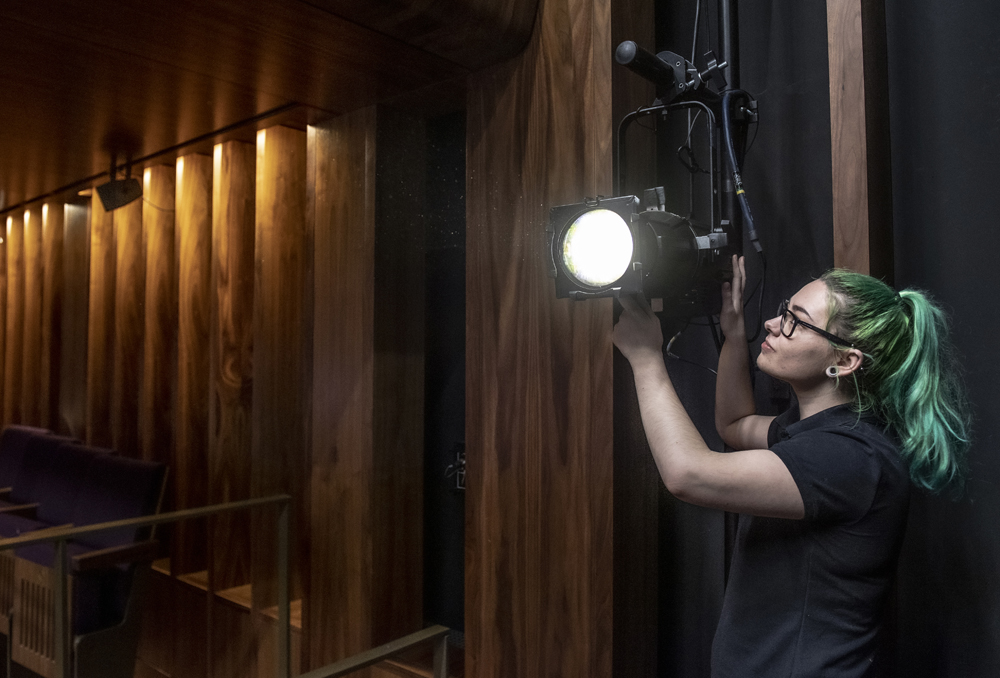Theatre is like an iceberg. For every individual you see stuff-strutting out front there are ten more somewhere in the creation process busily and skilfully making it happen. They include stage managers, designers, wig makers, directors, scenic constructors, electricians, sound engineers and many more. And too many young people simply don’t know these jobs exist because theatre is what they see on stage and, usually, nobody tells them otherwise.
Enter the Royal Opera House apprenticeship scheme which has, since 2007, been offering training posts to help young people acquire these vital off-stage theatre-making skills. 58 people have benefited so far and 88% of them have remained within the field of the performing arts. The scope has been extended to include work in IT, communications and finance departments because they all have a vital role to play in a big organisation such as ROH.
At any one time a group of young people learn on the job from people who’ve been doing it for decades either at ROH’s iconic Covent Garden venue or, more likely at the Production Park at Thurrock. There, nestled near the Thames, close to the Dartford Crossing is a spacious campus where, alongside other organisations, ROH has huge purpose-built workshops where, for instance, scenery painters and set builders can learn the craft.
Any apprenticeship package, as supported through the Government’s apprenticeship scheme, which there are plans to extend, involves being paid at least the minimum wage (less for under 19s) and being given time to attend college. It’s all about learning on the job under the supervision of experienced staff – and, for many, makes much more sense than paying tuition fees and incurring other expenses and debts at university.
Hermina Chance, for example, is featured as a case study on the ROH website. She applied for an ROH apprenticeship in hair, wigs and make-up because a friend spotted it online. Since the apprenticeship included one day a week at college learning the theory anyway, she thought it would be better “to get a foot in the theatre door” rather than simply going to college. “That way I could earn while also learning from industry professionals” she says.
Broadcast communications apprentice, Dani Patrick, spotted her apprenticeship on the government website National Apprenticeship Service. She is learning to collate social media and TV/radio coverage and enjoys photographing rehearsals, chaperoning film crews and sorting out cinema tickets for press around the UK. Her college commitment is one week every three months.
Harry Prescott is a scenic metal work apprentice. His girlfriend saw the original advertisement online. He applied but didn’t get in, but later did ROH work experience and asked to be informed of vacancies – thus, he was eventually able to embark on his apprenticeship. “No two days are the same” he says because he works on different projects, but the construction of metal frames to support scenery is often part of what he does.
Or take finance apprentice Roshan Panarkar who saw the opportunity advertised on the Indeed website and saw it as a way into finance while gaining a professional qualification at the same time. He works on sales leger, purchase leger and assists senior members of staff. He also goes to college for two days per fortnight.
Apprenticeships are topical now that we have a government which is backing away from Tony Blair’s “university for all” mantra and investing money in skills acquisition projects and promoting school and college courses which lead to them, such as T levels.
But as usual, knowledge on the ground lags behind what is actually happening. Royal Opera House for example has eight new 2021/2 vacancies for apprenticeships as it re-opens it doors for the first full season for eighteen months. Applications have recently closed for apprenticeships in technical theatre, costume, hair, wigs & make-up, scenic carpentry, social media and learning & participation events. How did school students find out about these?
“The devastation to the arts and the loss of careers in the creative industries has been tragic” says ROH Apprentice Manager, Bendy Ashfield. “With that as our backdrop, we have worked incredibly hard to ensure that the talent pipeline and apprenticeship opportunities remain a priority.”
Teachers and careers advisers can do their bit too. We would do well to inform ourselves about opportunities at ROH and in similar organisations for 2022/3 so that we can inform and encourage our students. It is very telling that none of the case studies mentions any support or advice from the trainee’s original school or college. In every case it was something they saw online or found for themselves. We owe it to young people to make sure we, in schools, give them current, up-to-date careers advice about an industry which changes and develops continually.
www.roh.org.uk



